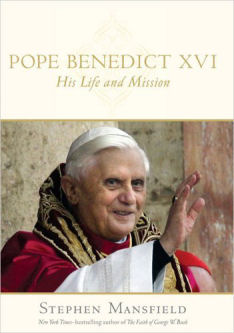
|
Posted September 18, 2005
Book: Pope Benedict XVI: His Life and Mission Author: Stephen Mansfield Penguin Group, NY, pp.195 An Excerpt from the Jacket:
In Pope Benedict XVI, bestselling author Sephen Mansfield tells the story of a youth who grew up in Nazi Germany and went from being a liberal theologian associated with Vatican II to a theological conservative who became Pope John Paul’s closest ally. As a cardinal, the new pope pursued a firmly traditional path in the last quarter of the century: He excommunicated radical priests, cracked down on Marxist liberation theology in Latin America, and shaped some of John Paul’s more socially conservative positions. He also drew a line of distinction between Catholicism and other faiths, promulgating respect for, but not equality among, the historic religions. The new pope is --- according to some --- the ultimate insider, whose election ensures that the revolution of John Paul II will be rendered permanent in the early part of our century. Mansfield provides a portrait that suggests the very theme of the new papacy: Benedict XVI will be the great caretaker. He will sustain the return to tradition marked by John Paul, and he will --- so early signs suggest --- seek to reevangelize Europe. For all the talk of Catholicism gravitating to Africa and Latin America, the choice of Benedict XVI unmistakably indicates the intent to preserve and rebuild Catholicism on the continent. Because of Ratzinger’s wealth of public statements, his positions on most pressing social issues --- e.g., stem cell research, contraception, the role of women --- are clear. What is less clear, writes Mansfield, is how or whether he will reach out to Islam. We have, however, some early indications even there, which are explored in Pope Bene XVI: As a cardinal, Ratzinger publicly opposed the inclusion of Turkey into the European Union, suggesting that its seventy-million predominantly Muslim population would alter the character of Europe, and encouraging Turkey to align with other Muslim nations. This is not a man who is going to meet the world on terms shaped by so-called multiculturalism. Whatever olive branches he extends, Mansfield contends, are going to have conditions attached. Pope Benedict XVI examines the new pope specifically from the perspective of a non-Catholic --- a committed Christian without fealty to Rome. Mansfield’s academic depth, his poetic but widely assessable writing style, and his ability to take complex religious ideas and make them understandable to the non-religious, lend his treatment of Pope Benedict XVI significance for readers of all philosophies and faiths. An Excerpt from the Book: For Ratzinger, the tradition of the Church is a sacred trust that must be painstakingly guarded from sin, error, or license. This is because “the Church is His [God’s], not ours.” So intensely does Ratzinger feel this commission that he is even willing for Christianity to become smaller and less culturally significant if that is the price of purity. In The Ratzinger Report, the then-cardinal said, Today more than ever the Christian must be aware that he belongs to a minority and that he is in opposition to everything that appears good, obvious, logical to the “spirit of the world,” as the New Testament calls it. Among the most urgent tasks facing Christians is that of regaining the capacity of nonconformism, i.e., the capacity to oppose many developments of the surrounding culture. Table of Contents: 1. Bavaria: Years of worship and war 2. Priest and professor: contending for the faith 3. Johannis Paulus Magnus: The legacy of Karol Wojtyla 4. Ratzinger and the CDF: Guarding Holy Tradition 5. Habemus Papam: “We have a Pope!” Epilogue: Quo Vadis? Appendix: Pope Benedict XVI in his own words |
|
